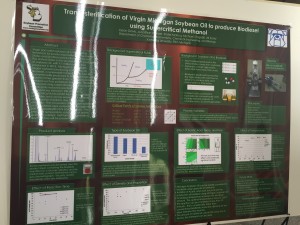In my last post, I highlighted some of the most interesting points of a recent trip to Kettering University, my alma mater. One of those had to do with a poster session going on, and in particular, a poster on creating biodiesel. I found it mind blowing – but mostly because of a shocking side note. I’m going to share it with you here, because you won’t see it if you just read the poster, named: “Transesterification of Virgin Michigan Soybean Oil to produce Biodiesel using Supercritical Methanol”.

In a nutshell, to get biodiesel fuel, you react some methanol with soybean oil and help it along by introducing heat and pressure. These guys: Jason Davis, Jonathan Wenzel, Endel Maricq, Michael Stogsdill and Ali Zand; messed around with trying to find sweet spots in the variables that would yield the most biodiesel. They also played with not needing to add extra, nasty chemicals to do this.
What they didn’t expect to see was when they used oil from Michigan soy beans found in their back yard, versus oil from beans grown in other parts of the US (those where biodiesel typically comes from), they got substantially more fuel in the end. AND THEY HAVE NO IDEA WHY.
These weren’t a different varietal of soybean, as far as I could gather – if that’s even a thing. These weren’t like Merlot soybeans compared with Boxed Franzia soybeans. For all known factors, these beans were identical aside from their birthplace. Yet, there is something on a very real, physical, chemical way that is remarkably different about them, which no one understands. This suggests strongly that there are variables we don’t even know exist.
So, remember Michigan soybeans. Remember Michigan soybeans when you scoff at people who worry about pesticides or GMO salmon or GMO corn or really anything that hasn’t been fully understood by us humans. By the way, things that haven’t been fully understood by us humans include EVERYTHING.
Drugs are formulated, produced and prescribed by professional professionals with side effects we don’t even know about until 20 years later. Pesticides are similarly used without fully understanding their effects. Genes are screwed with in food and, “it’s safe, don’t worry bout it,” but it can only be considered safe to the extent of the knowledge we have on the intricate inner workings of biological systems. Remember, we don’t understand soybeans. Soybeans. We don’t understand jack.
That’s really half the foundation of all science: We Fully Understand Nothing. My high school physics teacher roped me into loving physics from the first day of class when he issued a warning. He said, “you all need to understand that everything I’m about to teach you could be wrong. And one of you could be the person who makes the discovery that proves it.” Perhaps more surprising is the other half of the foundation of science: that there is a common faith among all mankind that there is a rhyme and a reason and formula to all we observe despite that lack of knowledge. But first, the nothing part. That’s not to say the knowledge we have garnered is worthless, but that room must be left in your mind always to consider there may be MORE to the story. There is so much more to the story! Check the oxymoron of scientific hubris at the door when considering all things, and first remember our lack of full knowledge and full understanding in all things. It’s only scientific.

